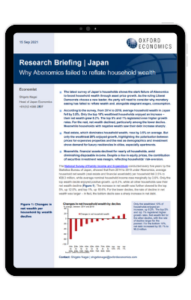Why Abenomics failed to reflate household wealth

The latest survey of Japan’s households shows the stark failure of Abenomics to boost household wealth through asset price growth. As the ruling Liberal Democrats choose a new leader, the party will need to consider why monetary easing has failed to reflate wealth and, alongside stagnant wages, consumption.
What you will learn:
- According to the survey, from 2014 to 2019, average household wealth in Japan fell by 3.5%. Only the top 10% wealthiest households enjoyed an increase – their net wealth grew 8.2%.
- Real estate, which dominates household wealth, rose by 3.5% on average. But only the wealthiest 20% enjoyed growth, highlighting the polarisation between prices for expensive properties and the rest as demographics and investment drove demand for luxury residencies in cities, especially apartments.
- Financial assets declined for nearly all households, amid diminishing disposable income.
Tags:
Related Services

Post
Food prices to bottom out in 2024, risks skewed to upside
Our baseline forecast is for world food commodity prices to register an annual decline this year, in aggregate, reducing pressure on food retail prices further downstream. However, we believe the risks to this forecast are overwhelmingly skewed to the upside.
Find Out More
Post
Battery raw material prices to recover
Battery raw materials prices bottomed out last quarter and we think a sustained recovery is looming. Midstream EV battery manufacturing activity has picked up again and inventories have returned to historical levels, suggesting upstream demand for raw materials will also bounce back.
Find Out More